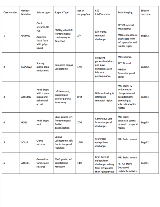Outcome of Epilepsy Surgery for Genetic Refractory Epilepsy
Abstract number :
2.329
Submission category :
9. Surgery / 9B. Pediatrics
Year :
2018
Submission ID :
500812
Source :
www.aesnet.org
Presentation date :
12/2/2018 4:04:48 PM
Published date :
Nov 5, 2018, 18:00 PM
Authors :
Ankita Ghosh, McGovern Medical School; Stephanie Garcia-Tarodo, McGovern Medical School; Manish Shah, McGovern Medical School; Michael Watkins, McGovern Medical School; Michael Funke, McGovern Medical School; and Gretchen Von Allmen, McGovern Medical Scho
Rationale: Genetic mutations are being increasingly identified in children with intractable epilepsy. These patients can still sometimes be good candidates for epilepsy surgery, but data regarding surgical outcome in patients with genetic mutations is limited. Methods: Subjects that have known genetic mutations as etiology for their epilepsy and have undergone surgery for intractable epilepsy in the last 10 years at our institution were identified. Retrospective chart review of the medical records, including genetic testing reports, pre-surgical evaluations, operative notes and clinical outcomes was performed. Results: Seven subjects were identified with genetic mutations that had epilepsy surgery. All the subjects had non-focal MRI findings, but had focal findings on ictal VEEG, fluorodeoxyglucose positron emission computed tomography (FDG-PET), or Magnetoencephalography (MEG) that were helpful in surgical decision-making. Types of surgery performed included cortical resection, corpus callosotomy, and cortical disconnection. 1/7 (14%) had Engel 1 outcome, 3/7 (42%) had Engel 2 outcome, 3/7 (42%) had Engel 3 outcome, and one subject had no worthwhile improvement, with a three years post operative period follow up. Conclusions: In our cohort, post-surgical seizure-free outcome in children with genetic causes of refractory epilepsy was variable. However, most had significant improvement in developmental outcome and quality of life, suggesting that in these children, expectations for surgical seizure freedom may need to be adjusted, with more emphasis placed on outcomes such as quality of life. Funding: None
